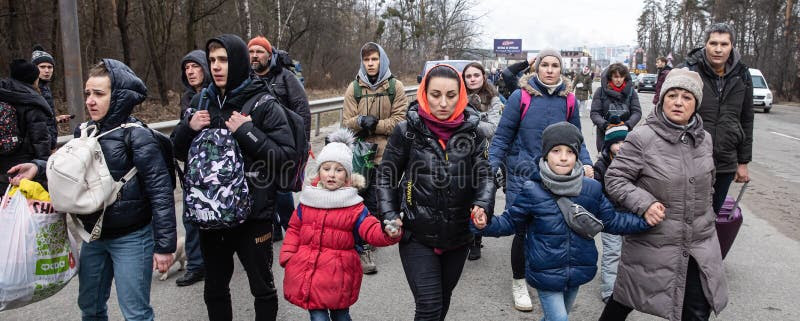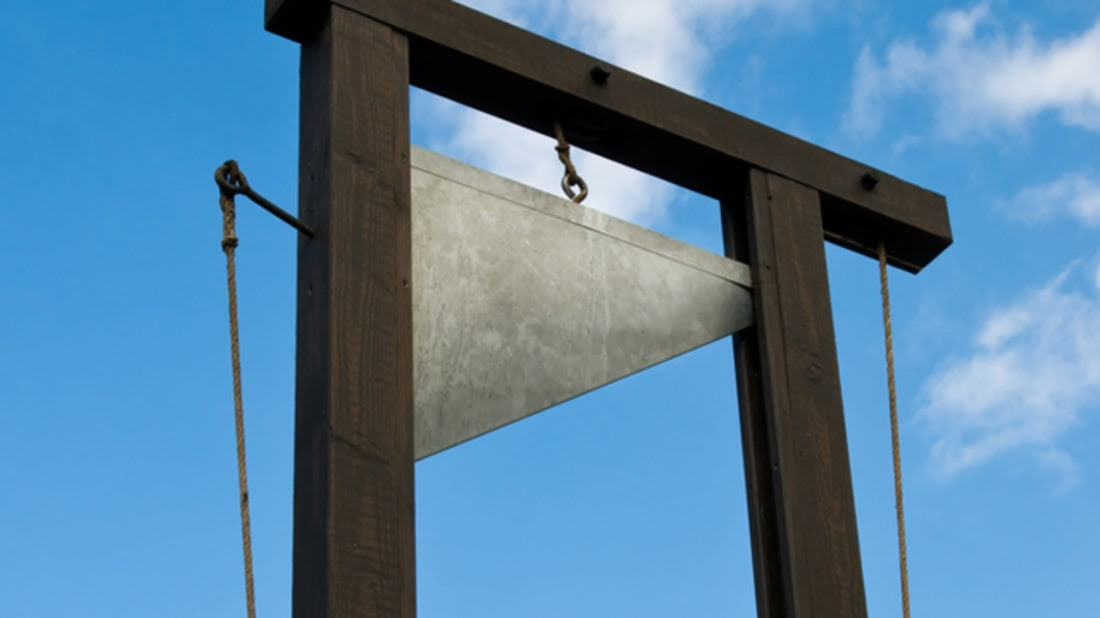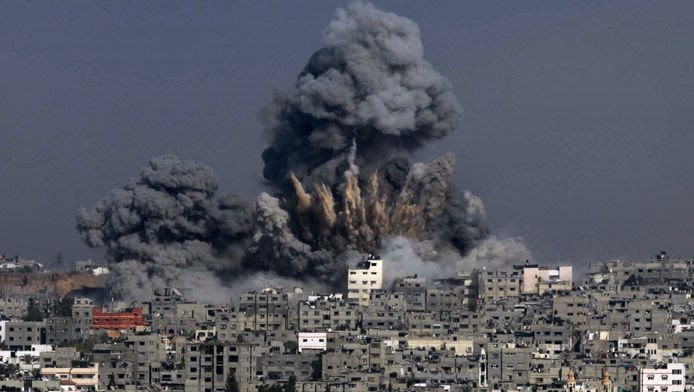
THE DESTRUCTION OF GAZA
GAZA IS STILL OCCUPIED TERRITORY
”The Israeli government’s plan to remove troops and Jewish settlements from the Gaza Strip would not end Israel’s occupation of the territory. As an occupying power, Israel will retain responsibility for the welfare of Gaza’s civilian population.
Under the “disengagement” plan endorsed Tuesday by the Knesset, Israeli forces will keep control over Gaza’s borders, coastline and airspace, and will reserve the right to launch incursions at will. Israel will continue to wield overwhelming power over the territory’s economy and its access to trade.”
HUMAN RIGHTS WATCH
ISRAEL: ”DISENGAGEMENT” WILL NOT
END GAZA OCCUPATION
28 OCTOBER 2004
Israeli Government Still Holds Responsibility for Welfare of Civilians
The Israeli government’s plan to remove troops and Jewish settlements from the Gaza Strip would not end Israel’s occupation of the territory. As an occupying power, Israel will retain responsibility for the welfare of Gaza’s civilian population.
Under the “disengagement” plan endorsed Tuesday by the Knesset, Israeli forces will keep control over Gaza’s borders, coastline and airspace, and will reserve the right to launch incursions at will. Israel will continue to wield overwhelming power over the territory’s economy and its access to trade.
“The removal of settlers and most military forces will not end Israel’s control over Gaza,” said Sarah Leah Whitson, Executive Director of Human Rights Watch’s Middle East and North Africa Division. “Israel plans to reconfigure its occupation of the territory, but it will remain an occupying power with responsibility for the welfare of the civilian population.”
Under the plan, Israel is scheduled to remove settlers and military bases protecting the settlers from the Gaza Strip and four isolated West Bank Jewish settlements by the end of 2005. The Israeli military will remain deployed on Gaza’s southern border, and will reposition its forces to other areas just outside the territory.
In addition to controlling the borders, coastline and airspace, Israel will continue to control Gaza’s telecommunications, water, electricity and sewage networks, as well as the flow of people and goods into and out of the territory. Gaza will also continue to use Israeli currency.
A World Bank study on the economic effects of the plan determined that “disengagement” would ease restrictions on mobility inside Gaza. But the study also warned that the removal of troops and settlers would have little positive effect unless accompanied by an opening of Gaza’s borders. If the borders are sealed to labor and trade, the plan “would create worse hardship than is seen today.”
The plan also explicitly envisions continued home demolitions by the Israeli military to expand the “buffer zone” along the Gaza-Egypt border. According to a report released last week by Human Rights Watch, the Israeli military has illegally razed nearly 1,600 homes since 2000 to create this buffer zone, displacing some 16,000 Palestinians. Israeli officials have called for the buffer zone to be doubled, which would result in the destruction of one-third of the Rafah refugee camp.
In addition, the plan states that disengagement “will serve to dispel the claims regarding Israel’s responsibility for the Palestinians in the Gaza Strip.” A report by legal experts from the Israeli Justice Ministry, Foreign Ministry and the military made public on Sunday, however, reportedly acknowledges that disengagement “does not necessarily exempt Israel from responsibility in the evacuated territories.”
If Israel removes its troops from Gaza, the Palestinian National Authority will maintain responsibility for security within the territory—to the extent that Israel allows Palestinian police the authority and capacity. Palestinian security forces will still have a duty to protect civilians within Gaza and to prevent indiscriminate attacks on Israeli civilians.
“Under international law, the test for determining whether an occupation exists is effective control by a hostile army, not the positioning of troops,” Whitson said. “Whether the Israeli army is inside Gaza or redeployed around its periphery and restricting entrance and exit, it remains in control.”
Under international law, the duties of an occupying power are detailed in the Fourth Geneva Convention and The Hague Regulations. According to The Hague Regulations, a “territory is considered occupied when it is actually placed under the authority of the hostile army. The occupation extends only to the territory where such authority has been established and can be exercised.”
The “disengagement plan,” as adopted by the Israeli Cabinet on June 6, 2004, and endorsed by the Knesset on October 26, is available at:
http://www.pmo.gov.il/nr/exeres/C5E1ACE3-9834-414E-9512-8E5F509E9A4D.htm.
EINDE HUMAN RIGHTS WATCH STATEMENT
NIEUW BERICHT:
Israel’s Obligations to Gaza under International Law
Israeli authorities claim “broad powers and discretion to decide who may enter its territory” and that “a foreigner has no legal right to enter the State’s sovereign territory, including for the purposes of transit into the [West Bank] or aboard.” While international human rights law gives wide latitude to governments with regard to entry of foreigners, Israel has heightened obligations toward Gaza residents. Because of the continuing controls Israel exercises over the lives and welfare of Gaza’s inhabitants, Israel remains an occupying power under international humanitarian law, despite withdrawing its military forces and settlements from the territory in 2005”
HUMAN RIGHTS WATCH
GAZA: ISRAEL’S ”OPEN AIR PRISON” AT 15
14 JUNE 2022
(Gaza) – Israel’s sweeping restrictions on leaving Gaza deprive its more than two million residents of opportunities to better their lives, Human Rights Watch said today on the fifteenth anniversary of the 2007 closure. The closure has devastated the economy in Gaza, contributed to fragmentation of the Palestinian people, and forms part of Israeli authorities’ crimes against humanity of apartheid and persecution against millions of Palestinians.
Israel’s closure policy blocks most Gaza residents from going to the West Bank, preventing professionals, artists, athletes, students, and others from pursuing opportunities within Palestine and from traveling abroad via Israel, restricting their rights to work and an education. Restrictive Egyptian policies at its Rafah crossing with Gaza, including unnecessary delays and mistreatment of travelers, have exacerbated the closure’s harm to human rights.
“Israel, with Egypt’s help, has turned Gaza into an open-air prison,” said Omar Shakir, Israel and Palestine director at Human Rights Watch. “As many people around the world are once again traveling two years after the start of the Covid-19 pandemic, Gaza’s more than two million Palestinians remain under what amounts to a 15-year-old lockdown.”
Israel should end its generalized ban on travel for Gaza residents and permit free movement of people to and from Gaza, subject to, at most, individual screening and physical searches for security purposes.
Between February 2021 and March 2022, Human Rights Watch interviewed 20 Palestinians who sought to travel out of Gaza via either the Israeli-run Erez crossing or the Egyptian-administered Rafah crossing. Human Rights Watch wrote to Israeli and Egyptian authorities to solicit their perspectives on its findings, and separately to seek information about an Egyptian travel company that operates at the Rafah crossing but had received no responses at this writing.
Since 2007, Israeli authorities have, with narrow exceptions, banned Palestinians from leaving through Erez, the passenger crossing from Gaza into Israel, through which they can reach the West Bank and travel abroad via Jordan. Israel also prevents Palestinian authorities from operating an airport or seaport in Gaza. Israeli authorities also sharply restrict the entry and exit of goods.
They often justify the closure, which came after Hamas seized political control over Gaza from the Fatah-led Palestinian Authority in June 2007, on security grounds. Israeli authorities have said they want to minimize travel between Gaza and the West Bank to prevent the export of “a human terrorist network” from Gaza to the West Bank, which has a porous border with Israel and where hundreds of thousands of Israeli settlers live.
This policy has reduced travel to a fraction of what it was two decades ago, Human Rights Watch said. Israeli authorities have instituted a formal “policy of separation” between Gaza and the West Bank, despite international consensus that these two parts of the Occupied Palestinian Territory form a “single territorial unit.” Israel accepted that principle in the 1995 Oslo Accords, signed with the Palestine Liberation Organization. Israeli authorities restrict all travel between Gaza and the West Bank, even when the travel takes place via the circuitous route through Egypt and Jordan rather than through Israeli territory.
Due to these policies, Palestinian professionals, students, artists, and athletes living in Gaza have missed vital opportunities for advancement not available in Gaza. Human Rights Watch interviewed seven people who said that Israeli authorities did not respond to their requests for travel through Erez, and three others who said Israel rejected their permits, apparently for not fitting within Israeli’s narrow criteria.
Walaa Sada, 31, a filmmaker, said that she applied for permits to take part in film training in the West Bank in 2014 and 2018, after spending years convincing her family to allow her to travel alone, but Israeli authorities never responded to her applications. The hands-on nature of the training, requiring filming live scenes and working in studios, made remote participation impracticable and Sada ended up missing the sessions.
The “world narrowed” when she received these rejections, Sada said, making her feel “stuck in a small box.… For us in Gaza, the hands of the clock stopped. People all over the world can easily and quickly book flight and travel, while we … die waiting for our turn.”
The Egyptian authorities have exacerbated the closure’s impact by restricting movement out of Gaza and at times fully sealing its Rafah border crossing, Gaza’s only outlet aside from Erez to the outside world. Since May 2018, Egyptian authorities have been keeping Rafah open more regularly, making it, amid the sweeping Israeli restrictions, the primary outlet to the outside world for Gaza residents.
Palestinians, however, still face onerous obstacles traveling through Egypt, including having to wait weeks for permission to travel, unless they are willing to pay hundreds of dollars to travel companies with significant ties to Egyptian authorities to expedite their travel, denials of entry, and abuse by Egyptian authorities.
Sada said also received an opportunity to participate in a workshop on screenwriting in Tunisia in 2019, but that she could not afford the US$2000 it would cost her to pay for the service that would ensure that she could travel on time. Her turn to travel came up six weeks later, after the workshop had already been held.
As an occupying power that maintains significant control over many aspects of life in Gaza, Israel has obligations under international humanitarian law to ensure the welfare of the population there. Palestinians also have the right under international human rights law to freedom of movement, in particular within the occupied territory, a right that Israel can restrict under international law only in response to specific security threats.
Israel’s policy, though, presumptively denies free movement to people in Gaza, with narrow exceptions, irrespective of any individualized assessment of the security risk a person may pose. These restrictions on the right to freedom of movement do not meet the requirement of being strictly necessary and proportionate to achieve a lawful objective. Israel has had years and many opportunities to develop more narrowly tailored responses to security threats that minimize restrictions on rights.
Egypt’s legal obligations toward Gaza residents are more limited, as it is not an occupying power. However, as a state party to the Fourth Geneva Convention, it should ensure respect for the convention “in all circumstances,” including protections for civilians living under military occupation who are unable to travel due to unlawful restrictions imposed by the occupying power. The Egyptian authorities should also consider the impact of their border closure on the rights of Palestinians living in Gaza who are unable to travel in and out of Gaza through another route, including the right to leave a country.
Egyptian authorities should lift unreasonable obstacles that restrict Palestinians’ rights and allow transit via its territory, subject to security considerations, and ensure that their decisions are transparent and not arbitrary and take into consideration the human rights of those affected.
“The Gaza closure blocks talented, professional people, with much to give their society, from pursuing opportunities that people elsewhere take for granted,” Shakir said. “Barring Palestinians in Gaza from moving freely within their homeland stunts lives and underscores the cruel reality of apartheid and persecution for millions of Palestinians.”
Israel’s Obligations to Gaza under International Law
Israeli authorities claim “broad powers and discretion to decide who may enter its territory” and that “a foreigner has no legal right to enter the State’s sovereign territory, including for the purposes of transit into the [West Bank] or aboard.” While international human rights law gives wide latitude to governments with regard to entry of foreigners, Israel has heightened obligations toward Gaza residents. Because of the continuing controls Israel exercises over the lives and welfare of Gaza’s inhabitants, Israel remains an occupying power under international humanitarian law, despite withdrawing its military forces and settlements from the territory in 2005. Both the UN and the International Committee of the Red Cross, the guardians of international humanitarian law, have reached this determination. As the occupying power, Israel remains bound to provide residents of Gaza the rights and protections afforded to them by the law of occupation. Israeli authorities continue to control Gaza’s territorial waters and airspace, and the movement of people and goods, except at Gaza’s border with Egypt. Israel also controls the Palestinian population registry and the infrastructure upon which Gaza relies.
Israel has an obligation to respect the human rights of Palestinians living in Gaza, including their right to freedom of movement throughout the Occupied Palestinian Territory and abroad, which affects both the right to leave a country and the right to enter their own country. Israel is also obligated to respect Palestinians’ rights for which freedom of movement is a precondition, for example the rights to education, work, and health. The UN Human Rights Committee has said that while states can restrict freedom of movement for security reasons or to protect public health, public order, and the rights of others, any such restrictions must be proportional and “the restrictions must not impair the essence of the right; the relation between the right and restriction, between norm and exception, must not be reversed.”
While the law of occupation permits occupying powers to impose security restrictions on civilians, it also requires them to restore public life for the occupied population. That obligation increases in a prolonged occupation, in which the occupier has more time and opportunity to develop more narrowly tailored responses to security threats that minimize restrictions on rights. In addition, the needs of the occupied population increase over time. Suspending virtually all freedom of movement for a short period interrupts temporarily normal public life, but long-term, indefinite suspension in Gaza has had a much more debilitating impact, fragmentating populations, fraying familial and social ties, compounding discrimination against women, and blocking people from pursuing opportunities to improve their lives.
The impact is particularly damaging given the denial of freedom of movement to people who are confined to a sliver of the occupied territory, unable to interact in person with the majority of the occupied population that lives in the West Bank, including East Jerusalem, and its rich assortment of educational, cultural, religious, and commercial institutions.
After 55 years of occupation and 15 years of closure in Gaza with no end in sight, Israel should fully respect the human rights of Palestinians, using as a benchmark the rights it grants Israeli citizens. Israel should abandon an approach that bars movement absent exceptional individual humanitarian circumstances it defines, in favor of an approach that permits free movement absent exceptional individual security circumstances.
Israel’s Closure
Most Palestinians who grew up in Gaza under this closure have never left the 40-by-11 kilometer (25-by-7 mile) Gaza Strip. For the last 25 years, Israel has increasingly restricted the movement of Gaza residents. Since June 2007, when Hamas seized control over Gaza from the Fatah-led Palestinian Authority (PA), Gaza has been mostly closed.
Israeli authorities justify this closure on security grounds, in light of “Hamas’ rise to power in the Gaza Strip,” as they lay out in a December 2019 court filing. Authorities highlight in particular the risk that Hamas and armed Palestinian groups will recruit or coerce Gaza residents who have permits to travel via Erez “for the commission of terrorist acts and the transfer of operatives, knowledge, intelligence, funds or equipment for terrorist activists.” Their policy, though, amounts to a blanket denial with rare exceptions, rather than a generalized respect for the right of Palestinians to freedom of movement, to be denied only on the basis of individualized security reasons.
The Israeli army has since 2007 limited travel through the Erez crossing except in what it deems “exceptional humanitarian circumstances,” mainly encompassing those needing vital medical treatment outside Gaza and their companions, although the authorities also make exceptions for hundreds of businesspeople and laborers and some others. Israel has restricted movement even for those seeking to travel under these narrow exceptions, affecting their rights to health and life, among others, as Human Rights Watch and other groups have documented. Most Gaza residents do not fit within these exemptions to travel through Erez, even if it is to reach the West Bank.
Between January 2015 and December 2019, before the onset of Covid-19 restrictions, an average of about 373 Palestinians left Gaza via Erez each day, less than 1.5 percent of the daily average of 26,000 in September 2000, before the closure, according to the Israeli rights group Gisha. Israeli authorities tightened the closure further during the Covid-19 pandemic – between March 2020 and December 2021, an average of about 143 Palestinians left Gaza via Erez each day, according to Gisha.
Israeli authorities announced in March 2022 that they would authorize 20,000 permits for Palestinians in Gaza to work in Israel in construction and agriculture, though Gisha reports that the actual number of valid permits in this category stood at 9,424, as of May 22.
Israeli authorities have also for more than two decades sharply restricted the use by Palestinians of Gaza’s airspace and territorial waters. They blocked the reopening of the airport that Israeli forces made inoperable in January 2002, and prevented the Palestinian authorities from building a seaport, leaving Palestinians dependent on leaving Gaza by land to travel abroad. The few Palestinians permitted to cross at Erez are generally barred from traveling abroad via Israel’s international airport and must instead travel abroad via Jordan. Palestinians wishing to leave Gaza via Erez, either to the West Bank or abroad, submit requests through the Palestinian Civil Affairs Committee in Gaza, which forwards applications to Israeli authorities who decide on whether to grant a permit.
Separation Between Gaza and the West Bank
As part of the closure, Israeli authorities have sought to “differentiate” between their policy approaches to Gaza and the West Bank, such as imposing more sweeping restrictions on the movement of people and goods from Gaza to the West Bank, and promote separation between these two parts of the Occupied Palestinian Territory. The army’s “Procedure for Settlement in the Gaza Strip by Residents of Judea and Samaria,” published in 2018, states that “in 2006, a decision was made to introduce a policy of separation between the Judea and Samaria Area [the West Bank] and the Gaza Strip in light of Hamas’ rise to power in the Gaza Strip. The policy currently in effect is explicitly aimed at reducing travel between the areas.”
In each of the 11 cases Human Rights Watch reviewed of people seeking to reach the West Bank, including East Jerusalem, for professional and educational opportunities not available in Gaza, Israeli authorities did not respond to requests for permits or denied them, either for security reasons or because they did not conform to the closure policy. Human Rights Watch also reviewed permit applications on the website of the Palestinian Civil Affairs Committee, or screenshots of it, including the status of the permit applications, when they were sent on to the Israeli authorities and the response received, if any.
Raed Issa, a 42-year-old artist, said that the Israeli authorities did not respond to his application for a permit in early December 2015, to attend an exhibit of his art at a Ramallah art gallery between December 27 and January 16, 2016.
The “Beyond the Dream” exhibit sought to highlight the situation in Gaza after the 2014 war. Issa said that the Palestinian Civil Affairs committee continued to identify the status of his application as “sent and waiting for response” and he ended up having to attend the opening of the exhibit virtually. Issa felt that not being physically present hampered his ability to engage with audiences, and to network and promote his work, which he believes limited his reach and hurt sales of his artwork. He described feeling pained “that I am doing my own art exhibit in my homeland and not able to attend it, not able to move freely.”
Ashraf Sahweel, 47, chairman of the Board of Directors of the Gaza Center for Art and Culture, said that Gaza-based artists routinely do not hear back after applying for Israeli permits, forcing them to miss opportunities to attend exhibitions and other cultural events. A painter himself, he applied for seven permits between 2013 and 2022, but Israeli authorities either did not respond or denied each application, he said. Sahweel said that he has “given up hope on the possibility to travel via Erez.”
Palestinian athletes in Gaza face similar restrictions when seeking to compete with their counterparts in the West Bank, even though the Israeli army guidelines specifically identify “entry of sportspeople” as among the permissible exemptions to the closure. The guidelines, updated in February 2022, set out that “all Gaza Strip residents who are members of the national and local sports teams may enter Israel in transit to the Judea and Samaria area [West Bank] or abroad for official activities of the teams.”
Hilal al-Ghawash, 25, told Human Rights Watch that his football team, Khadamat Rafah, had a match in July 2019 with a rival West Bank team, the Balata Youth Center, in the finals of Palestine Club, with the winner entitled to represent Palestine in the Asian Cup. The Palestinian Football Federation applied for permits for the entire 22-person team and 13-person staff, but Israeli authorities, without explanation, granted permits to only 4 people, only one of whom was a player. The game was postponed as a result.
After Gisha appealed the decision in the Jerusalem District Court, Israeli authorities granted 11 people permits, including six players, saying the other 24 were denied on security grounds that were not specified. Al-Ghawash was among the players who did not receive a permit. The Jerusalem district court upheld the denials. With Khadamat Rafah prevented from reaching the West Bank, the Palestine Football Federation canceled the Palestine Cup finals match.
Al-Ghawash said that West Bank matches hold particular importance for Gaza football players, since they offer the opportunity to showcase their talents for West Bank clubs, which are widely considered superior to those in Gaza and pay better. Despite the cancellation, al-Ghawash said, the Balata Youth Center later that year offered him a contract to play for them. The Palestinian Football Federation again applied for a permit on al-Ghawash’s behalf, but he said he did not receive a response and was unable to join the team.
In 2021, al-Ghawash signed a contract with a different West Bank team, the Hilal al-Quds club. The Palestinian Football Federation again applied, but this time, the Israeli army denied the permit on unspecified security grounds. Al-Ghawash said he does not belong to any armed group or political movement and has no idea on what basis Israeli authorities denied him a permit.
Missing these opportunities has forced al-Ghawash to forgo not only higher pay, but also the chance to play for more competitive West Bank teams, which could have brought him closer to his goal of joining the Palestinian national team. “There’s a future in the West Bank, but, here in Gaza, there’s only a death sentence,” he said. “The closure devastates players’ future. Gaza is full of talented people, but it’s so difficult to leave.”
Palestinian students and professionals are frequently unable to obtain permits to study or train in the West Bank. In 2016, Augusta Victoria Hospital in East Jerusalem agreed to have 10 physics students from Al-Azhar University in Gaza come to the hospital for a six-month training program. Israeli authorities denied five students permits without providing a rationale, two of the students said.
The five other students initially received permits valid for only 14 days, and then encountered difficulties receiving subsequent permits. None were able to complete the full program, the two students said. One, Mahmoud Dabour, 28, said that when he applied for a second permit, he received no response. Two months later, he applied again and managed to get a permit valid for one week. He received one other permit, valid for 10 days, but then, when he returned and applied for the fifth time, Israeli authorities rejected his permit request without providing a reason. As a result, he could not finish the training program, and, without the certification participants receive upon completion, he said, he cannot apply for jobs or attend conferences or workshops abroad in the field.
Dabour said that the training cannot be offered in Gaza, since the necessary radiation material required expires too quickly for it to be functional after passing through the time-consuming Israeli inspections of materials entering the Gaza Strip. There are no functioning devices of the kind that students need for the training in Gaza, Dabour said.
One of the students whose permit was denied said, “I feel I studied for five years for nothing, that my life has stopped.” The student asked that his name be withheld for his security.
Two employees of Zimam, a Ramallah-based organization focused on youth empowerment and conflict resolution, said that the Israeli authorities repeatedly denied them permits to attend organizational training and strategy meetings. Atta al-Masri, the 31-year-old Gaza regional director, said he has applied four times for permits, but never received one. Israeli authorities did not respond the first three times and, the last time in 2021, denied him a permit on the grounds that it was “not in conformity” with the permissible exemptions to the closure. He has worked for Zimam since 2009, but only met his colleagues in person for the first time in Egypt in March 2022.
Ahed Abdullah, 29, Zimam’s youth programs coordinator in Gaza, said she applied twice for permits in 2021, but Israeli authorities denied both applications on grounds of “nonconformity:”
This is supposed to be my right. My simplest right. Why did they reject me? My colleagues who are outside Palestine managed to make it, while I am inside Palestine, I wasn’t able to go to the other part of Palestine … it’s only 2-3 hours from Gaza to Ramallah, why should I get the training online? Why am I deprived of being with my colleagues and doing activities with them instead of doing them in dull breakout rooms on Zoom?
Human Rights Watch has previously documented that the closure has prevented specialists in the use of assistive devices for people with disabilities from opportunities for hands-on training on the latest methods of evaluation, device maintenance, and rehabilitation. Human Rights Watch also documented restrictions on the movement of human rights workers. Gisha, the Israeli human rights group, has reported that Israel has blocked health workers in Gaza from attending training in the West Bank on how to operate new equipment and hampered the work of civil society organizations operating in Gaza.
Israeli authorities have also made it effectively impossible for Palestinians from Gaza to relocate to the West Bank. Because of Israeli restrictions, thousands of Gaza residents who arrived on temporary permits and now live in the West Bank are unable to gain legal residency. Although Israel claims that these restrictions are related to maintaining security, evidence Human Rights Watch collected suggests the main motivation is to control Palestinian demography across the West Bank, whose land Israel seeks to retain, in contrast to the Gaza Strip.
Egypt
With most Gaza residents unable to travel via Erez, the Egyptian-administered Rafah crossing has become Gaza’s primary outlet to the outside world, particularly in recent years. Egyptian authorities kept Rafah mostly closed for nearly five years following the July 2013 military coup in Egypt that toppled President Mohamed Morsy, whom the military accused of receiving support from Hamas. Egypt, though, eased restrictions in May 2018, amid the Great March of Return, the recurring Palestinian protests at the time near the fences separating Gaza and Israel.
Despite keeping Rafah open more regularly since May 2018, movement via Rafah is a fraction of what it was before the 2013 coup in Egypt. Whereas an average of 40,000 crossed monthly in both directions before the coup, the monthly average was 12,172 in 2019 and 15,077 in 2021, according to Gisha.
Human Rights Watch spoke with 16 Gaza residents who sought to travel via Rafah. Almost all said they opted for this route because of the near impossibility of receiving an Israeli permit to travel via Erez.
Gaza residents hoping to leave via Rafah are required to register in advance via a process the UN Office for the Coordination of Humanitarian Affairs (OCHA) has deemed “confusing” and “obscure.” Gaza residents can either register via the formal registration process administered by Gaza’s Interior Ministry or informally via what is known as tanseeq, or travel coordination with Egyptian authorities, paying travel companies or mediators for a place on a separate list coordinated by Egyptian authorities. Having two distinct lists of permitted travelers coordinated by different authorities has fueled “allegations of the payment of bribes in Gaza and in Egypt to ensure travel and a faster response,” according to OCHA.
The formal process often takes two to three months, except for those traveling for medical reasons, whose requests are processed faster, said Gaza residents who sought to leave Gaza via Rafah. Egyptian authorities have at times rejected those seeking to cross Rafah into Egypt on the grounds that they did not meet specific criteria for travel. The criteria lack transparency, but Gisha reported that they include having a referral for a medical appointment in Egypt or valid documents to enter a third country.
To avoid the wait and risk of denial, many choose instead the tanseeq route. Several interviewees said that they paid large sums of money to Palestinian brokers or Gaza-based travel companies that work directly with Egyptian authorities to expedite people’s movement via Rafah. On social media, some of these companies advertise that they can assure travel within days to those who provide payment and a copy of their passport. The cost of tanseeq has fluctuated from several hundred US dollars to several thousand dollars over the last decade, based in part on how frequently Rafah is open.
In recent years, travel companies have offered an additional “VIP” tanseeq, which expedites travel without delays in transit between Rafah and Cairo, offers flexibility on travel date, and ensures better treatment by authorities. The cost was $700, as of January 2022.
The Cairo-based company offering the VIP tanseeq services, Hala Consulting and Tourism Services, has strong links with Egypt’s security establishment and is staffed largely by former Egyptian military officers, a human rights activist and a journalist who have investigated these issues told Human Rights Watch. This allows the company to reduce processing times and delays at checkpoints during the journey between Rafah and Cairo. The activist and journalist both asked that their names be withheld for security reasons.
The company is linked to prominent Egyptian businessman Ibrahim El-Argani, who has close ties with Egypt’s president, Abdel-Fattah al-Sisi. Ergany heads the Union of Sinai Tribes, which works hand-in-hand with the Egyptian military and intelligence agencies against militants operating in North Sinai. Ergany, one of Egypt’s few businessmen able to export products to Gaza from Egypt, owns the Sinai Sons company, which has an exclusive contract to handle all contracts related to Gaza reconstruction efforts. Human Rights Watch wrote to El-Argani to solicit his perspectives on these issues, but had received no response at this writing.
A 34-year-old computer engineer and entrepreneur said that he sought to travel in 2019 to Saudi Arabia to meet an investor to discuss a potential project to sell car parts online. He chose not to apply to travel via Erez, as he had applied for permits eight times between 2016 and 2018 and had either been rejected or not heard back.
He initially registered via the formal Ministry of Interior process and received approval to travel after three months. However, on the day assigned for his exit via Rafah, an Egyptian officer there said he found his reason for travel not sufficiently “convincing” and denied him passage. A few months later, he tried to travel again for the same purpose, this time opting for tanseeq and paying $400, and, this time, he successfully reached Saudi Arabia within a week of seeking to travel.
He said that he would like to go on vacation with his wife, but worries that Egyptian authorities will not consider vacation a sufficiently compelling reason for travel and that his only option will be to pay hundreds or thousands of dollars to do tanseeq.
A 73-year-old man sought to travel via Rafah in February 2021, with his 46-year-old daughter, to get knee replacement surgery in al-Sheikh Zayed hospital in Cairo. He said Gaza lacks the capacity to provide such an operation. The man and his daughter are relatives of a Human Rights Watch staff member. They applied via the Interior Ministry process and received approval in a little over a week.
After they waited for several hours in the Egyptian hall in Rafah on the day of travel, though, Egyptian authorities included the daughter’s name among the 70 names of people who were not allowed to cross that day, the daughter said. The father showed the border officials a doctor’s note indicating that he needed someone to travel with him given his medical situation, but the officer told him, “You either travel alone or go back with her to Gaza.” She said she returned to Gaza, alongside 70 other people, and her father later traveled on his own.
Five people who did manage to travel via Rafah said that they experienced poor conditions and poor treatment, including intrusive searches, by the Egyptian authorities, with several saying that they felt Egyptian authorities treated them like “criminals.” Several people said that Egyptian officers confiscated items from them during the journey, including an expensive camera and a mobile phone, without apparent reason.
Upon leaving Rafah, Palestinians are transported by bus to Cairo’s airport. The trip takes about seven hours, but several people said that the journey took up to three days between long periods of waiting on the bus, at checkpoints and amid other delays, often in extreme weather. Many of those who traveled via Rafah said that, during this journey, Egyptian authorities prevented passengers from using their phones.
The parents of a 7-year-old boy with autism and a rare brain disease said they sought to travel for medical treatment for him in August 2021, but Egyptian authorities only allowed the boy and his mother to enter. The mother said their journey back to Gaza took four days, mostly as a result of Rafah being closed. During this time, she said, they spent hours waiting at checkpoints, in extreme heat, with her son crying nonstop. She said she felt “humiliated” and treated like “an animal,” observing that she “would rather die than travel again through Rafah.”
A 33-year-old filmmaker, who traveled via Rafah to Morocco in late 2019 to attend a film screening, said the return from Cairo to Rafah took three days, much of it spent at checkpoints amid the cold winter in the Sinai desert.
A 34-year-old man said that he planned to travel in August 2019 via Rafah to the United Arab Emirates for a job interview as an Arabic teacher. He said, on his travel date, Egyptian authorities turned him back, saying they had met their quota of travelers. He crossed the next day, but said that, as it was a Thursday and with Rafah closed on Friday, Egyptian authorities made travelers spend two nights sleeping at Rafah, without providing food or access to a clean bathroom.
The journey to Cairo airport then took two days, during which he described going through checkpoints where officers made passengers “put their hands behind their backs while they searched their suitcases.” As a result of these delays totaling four days since his assigned travel date, he missed his job interview and found out that someone else was hired. He is currently unemployed in Gaza.
Given the uncertainty of crossing at Rafah, Gaza residents said that they often wait to book their flight out of Cairo until they arrive. Booking so late often means, beyond other obstacles, having to wait until they can find a reasonably priced and suitable flight, planning extra days for travel and spending extra money on changeable or last-minute tickets. Similar dynamics prevail with regard to travel abroad via Erez to Amman.
Human Rights Watch interviewed four men under the age of 40 with visas to third countries, whom Egyptian authorities allowed entry only for the purpose of transit. The authorities transported these men to Cairo airport and made them wait in what is referred to as the “deportation room” until their flight time. The men likened the room to a “prison cell,” with limited facilities and unsanitary conditions. All described a system in which bribes are required to be able to leave the room to book a plane ticket, get food, drinks, or a cigarette, and avoid abuse. One of the men described an officer taking him outside the room, asking him, “Won’t you give anything to Egypt?” and said that others in the room told him that he then proceeded to do the same with them
EINDE ARTIKEL
”“Israel has the responsibility as the Occupying Power to protect the civilian population. But instead of allowing a healthy people and economy to flourish, Israeli authorities have sealed off the Gaza Strip”
UNITED NATIONS
COLLECTIVE PUNISHMENT IN GAZA MUST END:
ISRAEL’S BLOCKADE ENTERS IN IT’S 7TH YEAR-
UN SPECIAL RAPPORTEUR
14 JUNE 2013
GENEVA, 14 June 2013 – The United Nations Special Rapporteur on the situation of human rights in the Palestinian territories occupied by Israel since 1967, Richard Falk, called today on Israel to end its blockade over the Gaza Strip, six years after it was tightened following the Hamas takeover in June 2007. The human suffering of the land, sea and air blockade imposed on the 1.75 million Palestinians living in one of the most densely populated and impoverished areas of the world has been devastating.
“Six years of Israel’s calculated strangulation of the Gaza Strip has stunted the economy and has kept most Gazans in a state of perpetual poverty and aid dependency,” said the UN expert. “Whether it is fishermen unable to go beyond six nautical miles from the shore, farmers unable to access their land near the Israeli fence, businessmen suffering from severe restrictions on the export of goods, students denied access to education in the West Bank, or patients in need of urgent medical attention refused access to Palestinian hospitals in the West Bank, the destructive designs of blockade have been felt by every single household in Gaza. It is especially felt by Palestinian families separated by the blockade,” he added.
“The people of Gaza have endured the unendurable and suffered what is insufferable for six years. Israel’s collective punishment of the civilian population in Gaza must end today,” said the Special Rapporteur.
“Israel has the responsibility as the Occupying Power to protect the civilian population. But instead of allowing a healthy people and economy to flourish, Israeli authorities have sealed off the Gaza Strip. According to statistics released by the Israeli Ministry of Defense, last month’s exports out of Gaza consisted of 49 truckloads of empty boxes, three truckloads of spices, one truckload of cut flowers, and one truckload of furniture,” he said. In 2012, the total number of truckloads of exports leaving Gaza was 254, compared to 9,787 in 2005 before the tightening of the blockade.
“It does not take an economist to figure out that such a trickle of goods out of Gaza is not the basis of a viable economy,” noted the UN expert. “The easing of the blockade announced by Israel in June 2010 after its deadly assault on the flotilla of ships carrying aid to the besieged population resulted only in an increase in consumer goods entering Gaza, and has not improved living conditions for most Gazans. Since 2007, the productive capacity of Gaza has dwindled with 80 percent of factories in Gaza now closed or operating at half capacity or less due to the loss of export markets and prohibitively high operating costs as a result of the blockade. 34 percent of Gaza’s workforce is unemployed including up to half the youth population, 44 percent of Gazans are food insecure, 80 percent of Gazans are aid recipients,” he said.
“To make matters worse, 90 percent of the water from the Gaza aquifer is unsafe for human consumption without treatment, and severe fuel and electricity shortage results in outages of up to 12 hours a day. Only a small proportion of Gazans who can afford to obtain supplies through the tunnel economy are buffered from the full blow of the blockade, but tunnels alone cannot meet the daily needs of the population in Gaza.”
“Last year, the United Nations forecast that under existing conditions, Gaza would be uninhabitable by 2020. Less optimistic forecasts presented to me were that the Gaza Strip may no longer be viable only three years from now,” said the Special Rapporteur. “It’s clear that the Israeli authorities set out six years ago to devitalize the Gazan population and economy,” he said, referring to a study undertaken by the Israeli Ministry of Defense in early 2008 detailing the minimum number of calories Palestinians in Gaza need to consume on a daily basis to avoid malnutrition. The myriad of restrictions imposed by Israel do not permit civilians in Gaza to develop to their full potential, and enjoy and exercise fully their human rights.
ENDS
In 2008, the UN Human Rights Council designated Richard Falk (United States of America) as the fifth Special Rapporteur on the situation of human rights on Palestinian territories occupied since 1967. The mandate was originally established in 1993 by the UN Commission on Human Rights.
Learn more, log on to: http://www2.ohchr.org/english/countries/ps/mandate/index.htm
UN Human Rights – Occupied Palestinian Territories: http://www.ohchr.org/EN/countries/MENARegion/Pages/PSIndex.aspx
UN Human Rights – Israel: http://www.ohchr.org/EN/Countries/MENARegion/Pages/ILIndex.aspx
For more information and media requests, please contact Kevin Turner (kturner@ohchr.org) or Kiyohiko Hasegawa khasegawa@ohchr.org) or write to sropt@ohchr.org
For media inquiries related to other UN independent experts:
Cécile Pouilly, UN Human Rights – Media Unit (+ 41 22 917 9310 / cpouilly@ohchr.org)
UN Human Rights, follow us on social media:
Facebook: https://www.facebook.com/unitednationshumanrights
Twitter: http://twitter.com/UNrightswire
Google+ gplus.to/unitednationshumanrights
YouTube: http://www.youtube.com/UNOHCHR
Storify: http://storify.com/UNrightswire
”Despite the 2005 Israeli disengagement from Gaza,[26] the United Nations, international human rights organisations, and the majority of governments and legal commentators consider the territory to be still occupied by Israel, supported by additional restrictions placed on Gaza by Egypt. Israel maintains direct external control over Gaza and indirect control over life within Gaza: it controls Gaza’s air and maritime space, as well as six of Gaza’s seven land crossings”
WIKIPEDIA
GAZA STRIP
”Under the “Disengagement” Plan, Gazans will still be subjected to the effective control of the Israeli military. Although Israel will supposedly remove its permanent military presence, Israeli forces will retain the ability and right to enter the Gaza Strip at will.[28]
Further, Israel will retain control over Gaza’s airspace, sea shore, and borders.[29] Under the Plan, Israel will unilaterally control whether or not Gaza opens a seaport or an airport. Additionally, Israel will control all border crossings, including Gaza’s border with Egypt.[30] And Israel will “continue its military activity along the Gaza Strip’s coastline.”[31] Taken together, these powers mean that all goods and people entering or leaving Gaza will be subject to Israeli control. ”
UNITED NATIONS
THE QUESTION OF PALESTINE
THE ISRAELI ”DISENGAGEMENT” PLAN”GAZA STILL OCCUPIED
THE ISRAELI “DISENGAGEMENT” PLAN: GAZA STILL OCCUPIED
UPDATED SEPTEMBER 2005
“The significance of the disengagement plan is the freezing of the peace process . . . . Effectively, this whole package called the Palestinian state, with all that it entails, has been removed indefinitely from our agenda . . . . All with a presidential blessing and the ratification of both houses of Congress.”.”
– Dov Weisglass, Senior Advisor to Israeli Prime Minister Ariel Sharon
Legal Analysis:
Israel’s “Disengagement” plan from the Gaza Strip states that once fully enacted “there will be no basis to the claim that the Strip is occupied land,”[1] even though the Plan envisages indefinite Israeli military and economic control over the Gaza Strip. over the Gaza Strip.
Israel’s eagerness to declare an end to the Gaza Strip’s occupation illustrates the strategy behind the Plan. First, Israel seeks to proclaim an end to the Gaza Strip’s occupation—ostensibly in order to absolve Israel of all legal responsibilities as an “occupying power”—while simultaneously retaining effective military control over the Gaza Strip and its inhabitants. Second, it hopes to garner international support for retaining and even expanding illegal colonies in the Occupied West Bank in exchange for a withdrawal from Gaza. This strategy’s success was most apparent in the April 14, 2004 Bush-Sharon press conference during which President Bush praised Sharon’s withdrawal plan and announced that “existing Israeli population centers” in Occupied Palestinian Territory would become part of Israel in any permanent status agreement.[2] Third, as Israeli Bureau Chief Dov Weisglass confessed, Israel hopes to indefinitely freeze the peace process.
Variations of this strategy are not new: during the interim period of the Oslo Accords, Israel similarly carved away Palestinian population centers while retaining control over Palestinian movement, economy, and natural resources. Although Israel maintained effective military control over the evacuated areas (“Area A”)—and was therefore legally bound by its legal obligations as an occupying power—some Israeli government advisors argued that Area A was no longer occupied territory and absolved themselves of all legal responsibility.[3] In public and even some diplomatic discourse the occupation disappeared,
occupied territory became “disputed” territory, and the conflict was no longer one between an occupying power and an occupied population but rather a land dispute between two equal parties.
Notwithstanding the terms of the Plan, Israel will remain an occupying power under international law after disengagement from Gaza and is therefore bound by the obligations of an Occupying Power under international customary law and the Fourth Geneva Convention.
This updated legal analysis was originally released in October 2004 and is still accurate today, despite recent developments along the occupied Gaza Strip’s border with Egypt and coordination activities with the Palestinian Authority.
I. ISRAEL OCCUPIES THE GAZA STRIP
A. Israel Occupies the Palestinian Territories
The term “occupation” describes a regime of control over territory and population by a foreign sovereign’s military.[4] When a foreign sovereign occupies land, international law obligates that sovereign to uphold basic standards to protect both the population under its control and the land on which that population lives.[5]
The Hague Regulations of 1907 set forth the basic legal standard: “Territory is occupied when it has actually been placed under the authority of the hostile army. The occupation only extends to the territory where such authority has been established and can be exercised.”[6] This definition represents customary international law [7] and has been reaffirmed and expounded upon at the Nuremberg Tribunal,[8] in the Fourth Geneva Convention (1949) and in its First Additional Protocol (1979),[9] in state practice, in United Nations’ resolutions, and in the judgment of the International Court of Justice.[10]
In June 1967, the Israeli military took control over the West Bank, including East Jerusalem, and the Gaza Strip (together, the “Palestinian Territories”).[11] Ever since, Israel has maintained actual and effective control over the Palestinian Territories and the indigenous Palestinian population thereon. Consequently, Israel belligerently occupies the Palestinian Territories as a matter of law.
B. The International Community Recognizes Israel as the Occupying Power of the
Palestinian Territories
Since 1967, the International Community has consistently held that Israel occupies the Palestinian Territories. United Nations Security Council resolution 242 called, in part, for Israel to withdraw from territories it “occupied.”[12] Since then, the international community—including the United States[13] —has consistently reaffirmed that the territories, including East Jerusalem, are “occupied” as a matter of law. Indeed, both the U.N. Security Council and the General Assembly reiterated in May 2004 that the Palestinian Territories are “occupied” as a matter of law.[14]
C. Israel’s Supreme Court Recognizes Israel as the Occupying Power of the
Palestinian Territories
The Israeli Supreme Court routinely refers to the Palestinian Territories [15] as occupied and selectively enforces international law with respect to the Israeli military presence there.[16]
In 1979, for example, the Israeli Supreme Court stated: “This is a situation of belligerency and the status of [Israel] with respect to the occupied territory is that of an Occupying Power.”[17] In 2002, the Israeli Supreme Court held again that the West Bank and Gaza Strip “are subject to a belligerent occupation by the State of Israel.”[18]
Most recently, in June, 2004, the Israeli Supreme Court reaffirmed that the Territories are occupied under international law.[19] In order to find the putative legal authority to confiscate thousands of acres of Palestinian land to construct its Wall, the High Court proclaimed: “Since 1967, Israel has been holding [the Palestinian Territories] in belligerent occupation.”[20]
Therefore, even though Israeli politicians may rhetorically dispute Israel’s occupation of the Palestinian Territories, Israeli courts continually recognize the Israeli military as the Occupying Power of the Palestinian Territories.
D. The International Court of Justice Recognizes Israel as the Occupying Power
In July 2004, the International Court of Justice held that “. . .[t]he territories occupied by Israel have for over 37 years been subject to its territorial jurisdiction as the occupying Power.”[21]
E. Israel Remains an Occupying Power under the Oslo Accords
Israel maintained effective military control over the Palestinian Territories during the Oslo period (roughly 1993-2000), satisfying the general international legal standard for occupation. During Oslo, the Israeli military continued land confiscation and nearly doubled the population of its illegal colonies. Further, it continued building bypass roads and infrastructure, rendered Palestinian movement even more difficult, and frequently conducted military operations in and around the areas in which it had putatively ceded control.
Since Oslo, the erection of Israel’s wall inside the Occupied West Bank provides another example of Israel’s ongoing control over Palestinians and their land.[22] The Wall—a regime of concrete, electrified fences, trenches, razor wire and sniper towers—effectively divides Palestinians from their agricultural and water resources, limits access of Palestinians to their property and restricts the freedom of movement of Palestinians within their own territory.
Moreover, the Oslo Accords specifically affirmed that the Palestinian Territories would remain under Israeli occupation until the conclusion and implementation of a final peace treaty. Although the Accords permitted limited self-administration for some Palestinians, the Accords expressly reiterated that the Gaza Strip and the West Bank will continue to be considered one territorial unit, and that withdrawal from Palestinian population centers will do nothing “to change the status” of the West Bank and Gaza Strip for the duration of the Accords.[23]
Finally, the United Nations,[24] the international community,[25] the Israeli Supreme Court,[26] and the International Court of Justice all held during and after Oslo that Israel continues to occupy the West Bank and Gaza Strip. The ICJ specifically emphasized that “[s]ubsequent events [to 1967’s War]…have done nothing to alter [the status of occupation].”[27]
II. THE GAZA STRIP REMAINS OCCUPIED TERRITORY EVEN IMPLEMENTATION
OF THE “DISENGAGEMENT” PLAN
A. Israel Will Retain Effective Control over the Gaza Strip and Will Therefore Remain
the Occupying Power
Under the “Disengagement” Plan, Gazans will still be subjected to the effective control of the Israeli military. Although Israel will supposedly remove its permanent military presence, Israeli forces will retain the ability and right to enter the Gaza Strip at will.[28]
Further, Israel will retain control over Gaza’s airspace, sea shore, and borders.[29] Under the Plan, Israel will unilaterally control whether or not Gaza opens a seaport or an airport. Additionally, Israel will control all border crossings, including Gaza’s border with Egypt.[30] And Israel will “continue its military activity along the Gaza Strip’s coastline.”[31] Taken together, these powers mean that all goods and people entering or leaving Gaza will be subject to Israeli control.
Finally, Israel will prevent Gazans from engaging in international relations.[32] Accordingly, if it enacts the “Disengagement” Plan as envisaged, Israel will effectively control Gaza—administratively and militarily.[33] Therefore, Israel will remain the Occupying Power of the Gaza Strip.
B. Israel Will Remain the Occupying Power of the Gaza Strip so long as Israel Retains
the Ability to Exercise Authority over the Strip
In The Hostages Case, the Nuremburg Tribunal expounded upon The Hague Regulations’ basic definition of occupation in order to ascertain when occupation ends.[34] It held that “[t]he test for application of the legal regime of occupation is not whether the occupying power fails to exercise effective control over the territory, but whether it has the ability to exercise such power.”[35] In that case, the Tribunal had to decide whether Germany’s occupation of Greece and Yugoslavia had ended when Germany had ceded de facto control to non-German forces of certain territories. Even though Germany did not actually control those areas, the Tribunal held that Germany indeed remained the “occupying power”—both in Greece and Yugoslavia generally and in the territories to which it had ceded control—since it could have reentered and controlled those territories at will.
Similarly, Israel will retain ultimate authority over Gaza and to a much greater degree than Germany in The Hostages Case: The Israeli military expressly reserves itself the right to enter the Gaza Strip at will. Further, Israel will not just retain the ability to exercise control over Gaza, but it will also retain effective control over Gaza’s borders, air and sea space, overall security, and international relations.
Moreover, even if Israel should devolve some of its duties to third parties—either as co-occupying powers or as designees—Israel will remain an occupying power so long as it retains the ability to effectively control the Gaza Strip at will, whether with Israel’s own troops or those of its agents or partners.
C. As an Occupying Power, Israel Must Protect Palestinians and Their Lands
Since Israel will continue to occupy the Gaza Strip, Israel will still be bound by its obligations under International Law—namely 1907’s Hague Regulations, the Fourth Geneva Convention, and international customary law. Under international law, an occupying power must uphold certain obligations to the people and land it occupies. For example, an occupying power must maintain the status quo of occupied territory and may never unilaterally annex territory or transfer its civilian population into occupied territory.[36] Moreover, the occupying power’s activity in occupied territory must, inter alia, be for the benefit of the population it occupies.[37]
Nevertheless, the absence of a “permanent” Israeli military presence and illegal settlers will mark a significant change in Gaza’s 37-year-history of belligerent Israeli occupation. The Fourth Geneva Convention does indeed contemplate changes in the degree of occupation; changes in circumstances, however, do not necessarily translate into the end of occupation.[38] Since Israel will retain such a high-degree of administrative and military authority over Gaza—control over air space, sea space, the provision of public utility services, all border crossings, military security, and international relations[39]—Israel will still be bound to all relevant provisions of the Fourth Geneva Convention, 1907’s Hague Regulations, and applicable customary international law.[40]
III. THE STRATEGY BEHIND THE DISENGAGEMENT PLAN
A. THE DISENGAGEMENT PLAN IS DEMOGRAPHICALLY MOTIVATED
Israel’s greatest battle is not against “terrorism,” but against demography. Statistical analyses project that Palestinian Christians and Muslims will comprise the majority of persons in Israel and the Occupied Palestinian Territories by the year 2020.[41] If Israel wants to remain a “Jewish state,” then it will be very difficult to maintain its Jewish identity if an ethno/religious minority continues to rule over an ethnic majority. Israeli journalist David Landau noted in a statement made to a British journalist that the Gaza plans represents “the simplest, crudest solution [to Israel’s demographic time bomb]: to dump Gaza and its 1.3 million Arabs in the hope that that would ‘buy’ [Israel] 50 more years.”[42]
Therefore, one of the primary motivations behind Israel’s “Disengagement” Plan is to “dump” 1.3 million non-Jews while illegally confiscating as much Palestinian land in the West Bank as possible.
B. ISRAEL SEEKS TO CONSOLIDATE GAINS IN THE WEST BANK IN EXCHANGE FOR
“CONCESSIONS” IN GAZA
While the world publicly debates the “Disengagement” Plan, Israel has been constructing the Wall in the Occupied West Bank. The Wall severs Palestinians from their lands, communities, and homes, while illegally appropriating more land and natural resources for Israeli colonies. In addition, Israel continues to expand illegal colonies in the Occupied West Bank. Since the ICJ issued its ruling on July 9, 2004 holding that the colonies are illegal, Israel has announced tenders for more than 2,300 housing units in the West Bank.
The success of Israel’s strategy became evident during a press conference on April 14, 2004, when U.S. President Bush, ostensibly in an effort to support the Gaza Plan, endorsed Israel’s plans to keep illegal West Bank colonies (which he termed “Israeli population centers”) in any permanent status agreement. President Bush further expressed U.S. opposition for Palestinian refugees’ right to return to homes and property inside Israel, which international law guarantees to them.
Unlike the Gaza settlements, however, the West Bank settlements that Israel would keep “in exchange” for its unilateral withdrawal from Gaza house tens of thousands of illegal colonists and stretch many miles into Occupied Palestinian Territory. In fact, just as Israel has evacuated 8,500 settlers from the occupied Gaza Strip and parts of the northern West Bank, it has embarked on plans to make room for 30,000 new settlers this year alone, primarily in and around occupied East Jerusalem.
Thus, Israel will demographically, and perhaps permanently, entrench its presence in the West Bank. Therefore, the Gaza withdrawal plan has less to do with what Israel is giving up in Gaza and more to do with what Israel plans on taking from the West Bank.
IV. CONCLUSION: CONSTRUCTIVE SOLUTIONS
Israel will retain effective military, economic, and administrative control over the Gaza Strip and will therefore continue to occupy the Gaza Strip—even after implementation of its “Disengagement Plan” as proposed. Because Israel will continue to occupy Gaza, it will still be bound by the provisions of 1907’s Hague Regulations, the Fourth Geneva Convention and relative international customary law.
This is not to say, however, that removing Gaza’s settlers or reducing the Israeli military presence in and around the Gaza Strip could not usher in a better age for Palestinians and Israelis alike. Palestinians appreciate any movement on Israel’s part towards compliance with international law. Compliance with international law brings Palestinians closer to liberation and the region closer to stability. By providing non-violent channels to achieve fair results, international law helps silence extremist positions and activity while bringing both sides closer to a negotiated peace. Additionally, respect for international law affirms the credibility of more powerful nations who routinely invoke it as the legitimate basis for their own actions.
Israel’s “Disengagement” Plan however does not represent a good faith effort at advancing peace. Rather, Israel is selectively complying with some international legal standards in the Gaza Strip to preempt criticism for massive violations in the West Bank (including East Jerusalem). In so doing, Israel ensures that the conflict will continue and perhaps intensify. If Israel maintains effective control over the Gaza Strip, denying it the ability to develop internally or trade externally, Gaza could become a greater humanitarian disaster than it already is. Or if Israel eventually proclaims Gaza the “State of Palestine,” the freedom guaranteed under international law might become ever more distant for Palestinians elsewhere.
The international community should ensure that whatever unilateral measures Israel takes conform to international law and are not used to justify violations of international law elsewhere.
Today, however, Israel is making room for over 30,000 new settlers in the occupied West Bank this year alone, especially in and around occupied East Jerusalem—or almost four times the number of settlers that were evacuated from the occupied Gaza Strip as part of “Disengagement.”
We now have an historic opportunity for peace in the Middle East. Rather than an illegal declaration of an end of occupation on less than 4% of the Palestinian territory that Israel occupies, Israel should join the new Palestinian Leadership in negotiating an end of conflict.
Peace is the best security for both Palestinians and Israelis and the only secure peace is an agreed peace. We know the contours of any final status agreement; we have the opportunity; and both the Palestinian and Israeli people have the will. An immediate return to bilateral negotiations, with the international community as mediator, would help to bring permanent and positive change to the Middle East.
[1] Gaza “Disengagement” Plan, Section II.A.3, available at << http://www.nad-plo.org/gazaplan.php>>, last checked September 21, 2004.
[2] George W. Bush, Letter of Assurances to Israeli Prime Minister Ariel Sharon,
[3] See, e.g., Dore Gold, From ‘Occupied Territories’ to ‘Disputed Territories,’ January, 2002, available at <http://www.jcpa.org/jl/vp470.htm>, last checked July 25, 2004. Cf. Joel Singer, legal adviser to the Israeli Ministry of Foreign Affairs, who stated after the signing of the Oslo Accords that “notwithstanding the transfer of a large portion of the powers and responsibilities currently exercised by Israel to Palestinian hands, the status of the West Bank and Gaza Strip will not be changed during the interim period.” Joel Singer, “The Declaration of Principles on Interim Self-Government Arrangements,” I Justice 4, 6 (Int’l Assn of Jewish Lawyers and Jurists, 1994).
[4] Convention (IV) respecting the Laws and Customs of War on Land and its annex: Regulation concerning the Laws and Customs of War on Land, 3 Martens Nouveau Recueil (ser. 3) 461, 187 Consol. T.S. 227, entered into force Jan. 26, 1910, hereinafter “The Hague Convention.”
[5] Customary international law governs these basic obligations, which are articulated in 1907’s Hague Convention, 1949’s Fourth Geneva Convention, and 1977’s First Protocol to the Fourth Geneva Convention.
[6] The Hague Conventions, see note 4 supra.
[7] Robbie Savel, The Problematic Fourth Geneva Convention: Rethinking the International Law of Occupation, The Jurist, available at <http://jurist.law.pitt.edu/forum/forumnew120.php>, last checked June 9, 2004 (asserting that the Hague Regulations have achieved status as customary international law—that is, a set of binding international norms recognized by the community of nations—and that most of the provisions of the Fourth Geneva Convention and its 1st Additional Protocol have also achieved that status).
[8] U.S. v. Wilhelm List, Nuremberg Tribunal, 1948.
[9] Geneva Convention relative to the protection of Civilian Persons in Time of War, 75 U.N.T.S 287 (1949); Protocol Additional to the Geneva Conventions of 12 August 1949, and Relating to the Protection of Victims of International Armed Conflicts (Protocol I), 1125 U.N.T.S. 3 (1979).
[10] See note 21 supra and accompanying text.
[11] Israel also assumed control over Syria’s Golan Heights and Egypt’s Sinai Peninsula. While Israel returned the Sinai to Egypt, Israel still occupies Syria’s Golan Heights.
[12] United Nations Security Council Resolution 242 (1967).
[13] See, e.g., U.S. State Department Country Report on Israel and the Occupied Territories, 2003, released February 25, 2004, available at <http://www.state.gov/g/drl/rls/hrrpt/2003/27929.htm#occterr>, last checked June 27, 2004 (referring to the West Bank, Gaza, and East Jerusalem as “occupied territories”).
[14] United Nations Security Council resolution 1544 (2004) (cites Israel’s obligations as an “occupying Power” under international law and references the Territories “occupied” since 1967); United Nations General Assembly resolution 58/292 (2004) (affirming “that the status of the Palestinian Territory occupied since 1967, including East Jerusalem, remains one of military occupation”).
[15] Israel, however, claims to have annexed East Jerusalem and the Golan Heights pursuant to domestic Israeli law, which the international community has rejected en masse. See, e.g., United Nations Security Council Resolution 252.
[16] Although the Israeli Supreme Court does recognize Palestinian territories as “occupied” under international law, it does not recognize de jure application of the Fourth Geneva Convention, contrary to universal international opinio juris. For a discussion on this distinction and its lack of legal foundation, see Claude Bruderlein, “Legal Aspects of Israel’s Disengagement Plan under International Humanitarian Law,” Harvard University Program on Humanitarian Policy and Conflict Research (August, 2004).However, the Supreme Court selectively does apply some humanitarian provisions of the Fourth Geneva Convention.
[17] 606 Il. H.C. 78, Ayub, et al. v. Minister of Defence, et al. (The Beth Case); 610 Il. H.C. 78, Matawa et al. v. Minister of Defence, et al. (The Bekaot Case), reprinted in Antoine Bouvier and Marco Sassoli, How Does Law Protect in War? Cases, Documents and Teaching Materials on Contemporary Practice in International Humanitarian Law, International Committee of the Red Cross, pps. 812-817, Geneva, 1999, hereinafter “ICRC 1999.” Ironically, the Supreme Court terms the Palestinian Territories “occupied” so that it can confiscate Palestinian land: Under the Law of Occupation, the occupying power’s military boasts authority to temporarily confiscate land necessary to achieve military objectives.
[18] Adjuri v. IDF Commander, 7015 Il. H.C. 02, 7019 Il. H.C. 02 (2002).
[19] 2056 Il. H.C. 04 (2004).
[20] Id. at 1.
[21] Int’l C.J. Advisory Opinion on the L. Consequences of the Construction of a Wall in the Occupied Palestinian Territory, at 112 (2004).
[22] For more information on Israel’s Wall, please visit << http://www.nad-plo.org/wprimary.php>>, last checked July 4, 2004.
[23] Agreement on Preparatory Powers and Responsibilities (August 9, 1994), Article XIII, Secs. 4, 5.
[24] See notes 12-14 supra and accompanying text.
[25] Id.
[26] See notes 15 et seq. and accompanying text, emphasizing, however, that the Israeli Supreme Court does not consider East Jerusalem or the Golan Heights to be “occupied,” since Israel unilaterally annexed those territories, which the international community recognizes as “null and void.” See, e.g., United Nations Security Council Res. 478 (1980).
[27] Int’l C.J. Advisory Opinion on the L. Consequences of the Construction of a Wall in the Occupied Palestinian Territory, at 78 (2004).
[28] Sharon’s Gaza Disengagement Plan, May 28, 2004, Section III.A.3(stating that “[t]he State of Israel reserves the basic right to self defense, which includes taking preventive measures as well as the use of force against threats originating in the Gaza Strip”).
[29] Id. at Section III.A.1.
[30] Id. at Section VI.
[31] Id. at Section III.A.1.
[32] Id. generally.
[33] Claude Bruderlein, “Legal Aspects of Israel’s Disengagement Plan under International Humanitarian Law,” Harvard University Program on Humanitarian Policy and Conflict Research (August, 2004), available upon request.
[34] See note 4 supra and accompanying text.
[35] U.S.A v. Wilhelm List, Nuremberg Tribunal, 1948.
[36] See Fourth Geneva Convention (1949), Articles 47-49 and Protocol I to the Fourth Geneva Convention (1979).
[37] See Int’l C.J. Advisory Opinion on the L. Consequences of the Construction of a Wall in the Occupied Palestinian Territory, at 123-26 (2004).
[38] See Fourth Geneva Convention (1949), Article 6.
[39] See Section II.A, supra.
[40] See, e.g., International Covenant on Civil and Political Rights, the International Covenant on Economic, Social and Cultural Rights, and the Convention of the Rights of Child.
[41] See, e.g., Jonathan Freedland, A Gift of Dust and Bones: Sharon’s Plan for a Pullout Owes More to Demographic Shifts than a Belated Conversion to Peace-Making, The Guardian, Wed. June 2, 2004.
[42] Id.
Document Type: Report
Country: Israel
Subject: Gaza Strip, Palestine question, Peace process, Settlements, Statehood-related
Publication Date: 01/09/2005

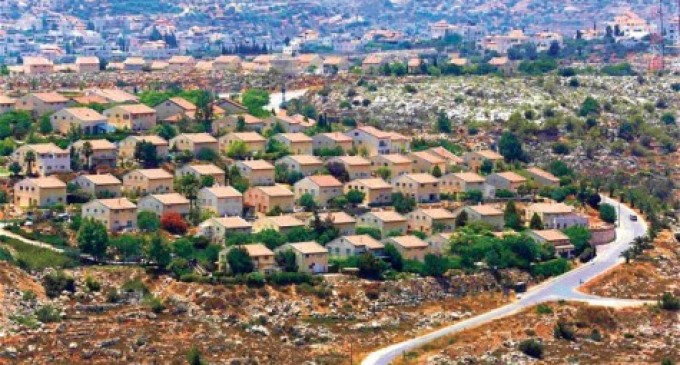
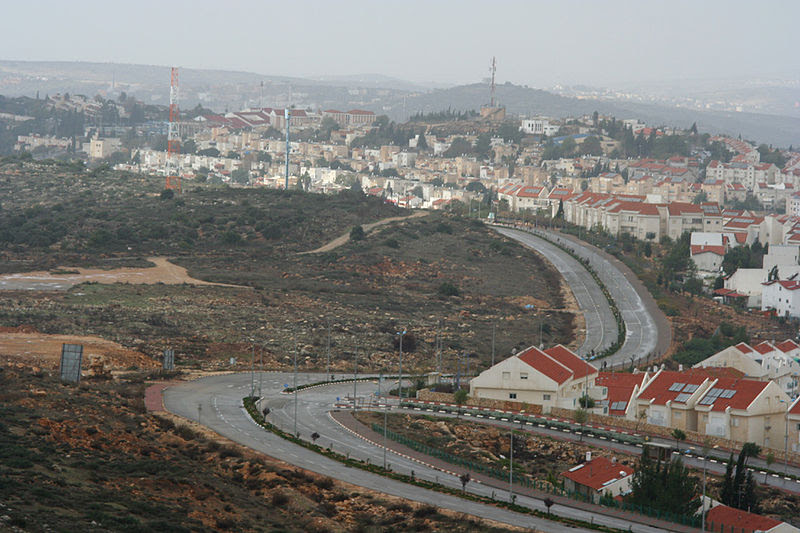.jpg/800px-Arieal,_Shomron(Storms_04).jpg)



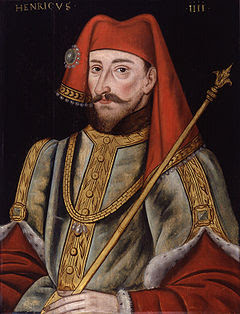


.jpg)

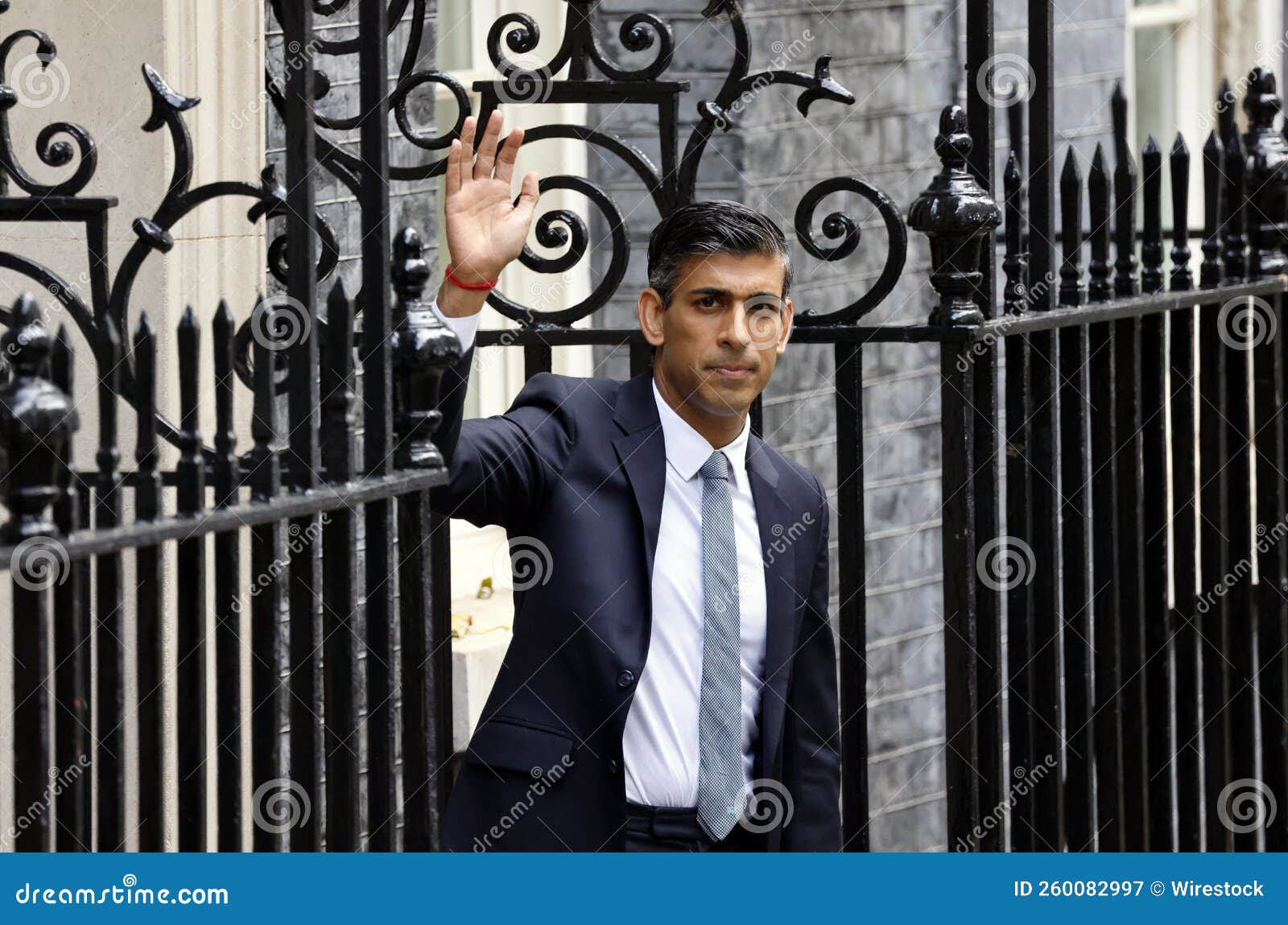
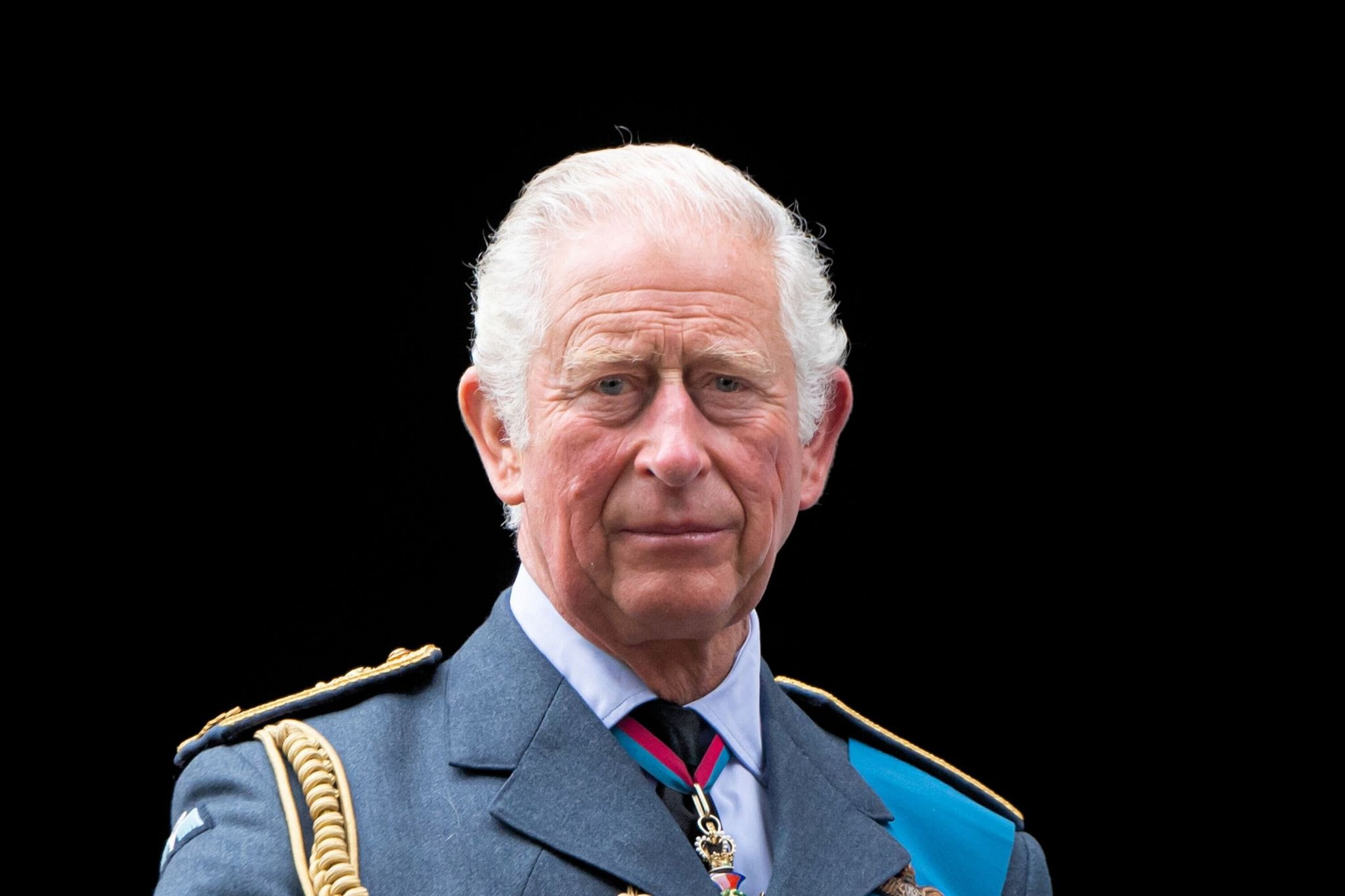 IMAGE SOURCE,GETTY IMAGES
IMAGE SOURCE,GETTY IMAGES


